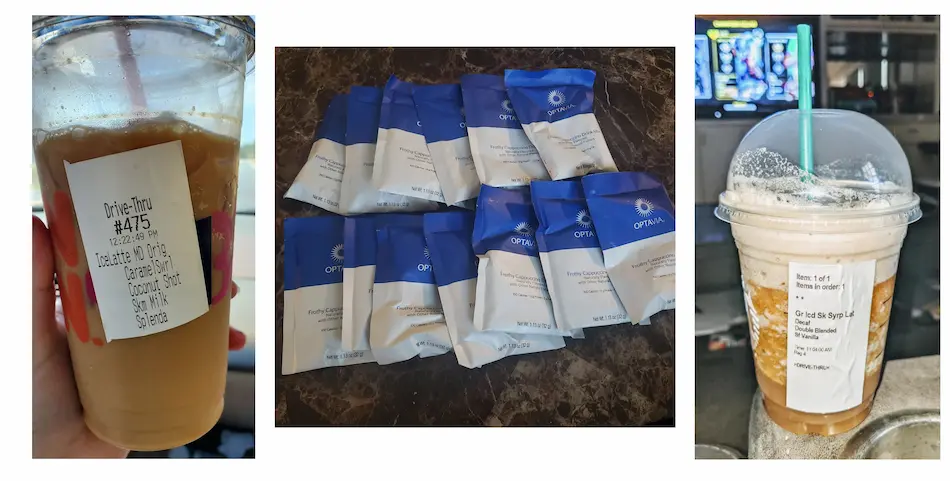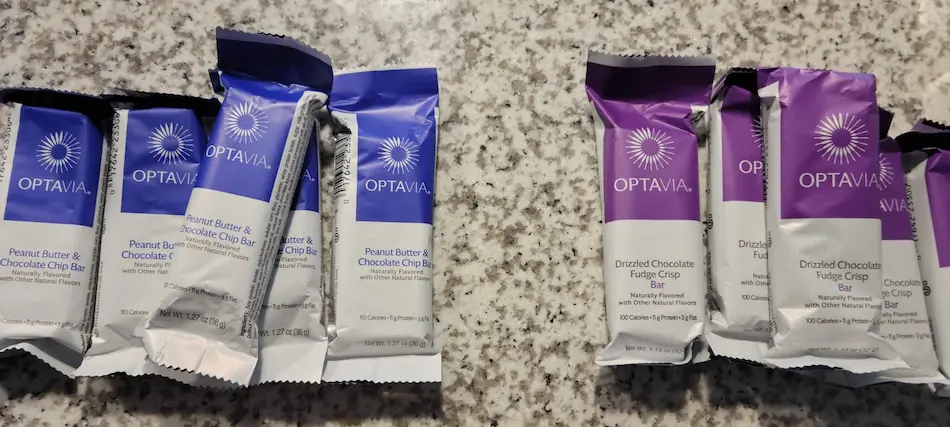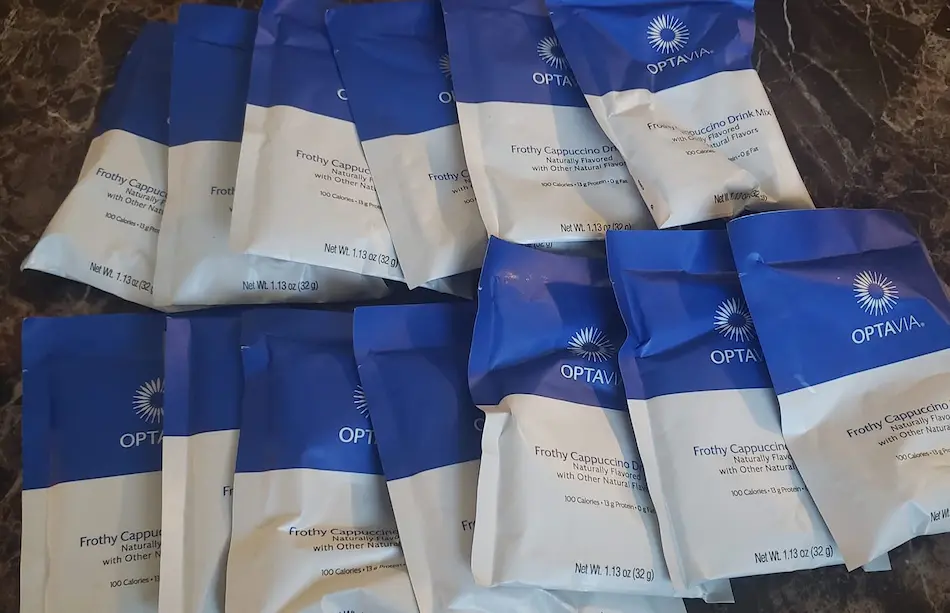As someone who is sensitive to caffeine, I need to be very careful when choosing the right Optavia fuelings.
Although caffeine is widely consumed and generally considered safe, it can have negative effects on certain people, such as pregnant women, children, adolescents, young adults, and people with health conditions.
In this article, I will explain which Optavia fuelings contain caffeine and how much caffeine is present in each product, to help those who need to be mindful of their caffeine intake make informed choices.

Does Optavia contain caffeine?
Caffeine in the morning makes me energetic and awaken.
Caffeine at night disrupts my sleep.
Therefore, I need to be very careful about which fuelings I eat, especially after 2 pm.
Generally, Optavia fuelings, such as bars, shakes, soups, crunchers, and snacks do not contain caffeine.
(These are the fuelings I can eat even at midnight without any problems.)
Here’s a photo of my Optavia peanut butter chocolate chip bar and Chocolate Fudge Crisp bars.

(None of these have caffeine, but they do contain soy and milk.)
The only Optavia products you can find with added caffeine are calorie burn flavor infusers and frothy cappuccino drink.
Here’s a photo of my Optavia Frothy Cappuccino Boost sachets, all containing caffeine.

(Still good to drink, but not in the late afternoon.)
However, keep in mind that the company often updates or improves its fuelings formula.
According to Optavia ClaimsSheet from 2021, the Caramel Macchiato used to have 7 mg of caffeine.
Right now it has zero.
Also, the old version of Mocha Shake Mix – Optavia Mocha Blast – used to have 28 mg of caffeine. Again, now it has zero.
So it’s always a good idea to check the packaging label in advance.
How much caffeine is in Optavia fuelings?
When it comes to caffeine content, both Optavia cappuccino and calorie burn flavor infuser drinks are the same.
According to the Optavia website, one serving of cappuccino drink mix and flavor infuser has 100 mg of caffeine, which is relatively high when compared to other meal replacement shakes or bars.
From what I’ve seen (and tried), most of the protein shakes contain 0-10 mg of caffeine per serving.
On the other hand, some other similar products may have higher caffeine content.
For example, some energy bars have as much as 100 mg per serving:
- Better Than Coffee Energy Bar – 100 mg
- Verb Energy Caffeinated Snack Bars – 65 mg
- Atkins Mocha Latte Shake – 110 mg
- Atkins Cafe Caramel – 100 mg
- Excelent Protein Bar – 82 mg
What’s more, some energy drinks can have as much as 300 mg of caffeine per can.
- Bang Energy drinks – 300 mg
- Reign Total Body Fuel – 300 mg
- Red Bull (16 fl oz) – 147 mg
- Cup of coffee – 95 mg
Caffeine and weight loss on Optavia
Although I’m sensitive to caffeine, I do recognize its potential weight loss benefits.
For example, one of the reasons why I like to drink 2 cups of coffee in the morning is to control my hunger and appetite.
According to a randomized controlled trial published in the Obesity Journal, “overweight and obese people ate less when they had coffee compared to when they had no coffee or a lower amount of coffee.”
This was true for both the next meal and for the whole day.
Critical Reviews in Food Science and Nutrition published a meta-analysis of 13 different studies that had 606 people in them and found that “caffeine does help people lose weight.”
Does it mean that drinking more coffee leads to better weight loss?
I don’t think so.
Too much caffeine can have bad effects on the body like making you feel shaky and anxious or making it hard to sleep.
These effects can make it harder to lose weight because not getting enough sleep or feeling stressed often leads to weight gain.
What’s more, the Journal of the American College of Nutrition states that “coffee without caffeine made people feel less hungry during the study.”
This suggests that one or more ingredients in coffee (other than caffeine) may help people lose weight.
Can you have caffeine on Optavia?
I had, but not too much.
Caffeine is generally okay to consume while on the Optavia diet.
I mean, it is a natural stimulant found in many foods and drinks, like coffee, tea, chocolate, and some soft drinks.
So it may help increase energy levels and mental focus which can be helpful while being on a calorie restriction.
The only reason why many of the Optavia fuelings don’t have caffeine is becasue people are sensitive to them.
So imagine if you have to eat 5 fuelings per day and each one of them contains 100 mg of caffeine.
Plus, if you also like to drink 1-2 cups of coffee per day, that’s a total of 500-700 mg of caffeine per day.
(An equivalent to five to six cups of coffee.)
Caffeine and its impact on sleep
According to the article published in the Sleep Medicine Reviews, “Adenosine is responsible for promoting sleep and caffeine helps you to stay awake by blocking adenosine.
So when you consume caffeine, it makes it harder to fall asleep and stay asleep.
The effects of caffeine can last for several hours, so “try not to consume it later in the day or before bedtime,” states the journal.
As I’ve mentioned earlier, too much caffeine makes it harder for me to sleep well.
It often decreases the amount of time I spend in deep sleep and increases the amount of time I spend in light sleep.
As you can imagine, this makes me feel tired and not well-rested in the morning.
So, what’s the recommended daily caffeine intake on Optavia?
It depends.
On the one hand, the FDA has said that for healthy adults, 400 milligrams of caffeine a day is not harmful.
On the other hand, some people are more sensitive to caffeine than others. And some people break down caffeine faster than others.
I don’t drink more than 2 cups of coffee. (Sometimes 3 cups, but only on the workout days.)
Plus, keep in mind that during my Optavia 5 and 1 plan, I was a big fan of diet sodas.I could drink 2-3 cans of diet coke, every day.
Now, a typical can of cola contains around 34 mg of caffeine.
The bottom line
It is important to know where caffeine comes from and how much is in the food or drink.
This is especially important if you are trying to consume less caffeine.
Plus, Optavia is constantly updating and changing its recipes.
They can often change and mix the ingredients, so for a more accurate caffeine count, look up the labels of each ingredient.
